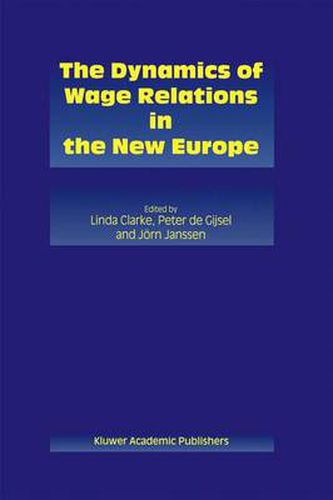Readings Newsletter
Become a Readings Member to make your shopping experience even easier.
Sign in or sign up for free!
You’re not far away from qualifying for FREE standard shipping within Australia
You’ve qualified for FREE standard shipping within Australia
The cart is loading…






This title is printed to order. This book may have been self-published. If so, we cannot guarantee the quality of the content. In the main most books will have gone through the editing process however some may not. We therefore suggest that you be aware of this before ordering this book. If in doubt check either the author or publisher’s details as we are unable to accept any returns unless they are faulty. Please contact us if you have any questions.
he debate on ‘The Dynamics of Wage Relations in the New Europe’ is an T offspring of a research project on ‘Disparities in Wage Relations and the Reproduction of Skills in Europe’. At a meeting of the advisory committee for this research held at the University of Westminster in London on 14th November 1994, it was decided (by Linda Clarke,]orn]anssen, Henryk Lewandowski, Philippe Mehaut, Patrick Rozenblatt and Frank Wilkinson) to set up a larger international committee to develop a programme and seek funding from the European Commission for a symposium of experts on wage relations. This committee of ten scientific experts was formed and invited to a number of meetings throughout 1995 and 1996 by DG V of the European Commission in order to develop a programme and proposal for a symposium to take place in 1997. Eventually the proposal, formally submitted by University of Westminster/London, University ofMaastrichti Netherlands, Fachhochschule Dortmund/Germany and University of Osnabriick/ Germany was accepted by the European Commission in May 1996. Additional funding was then obtained from the Hans-Bockler-Stiftung and the Dutch Organisation for Scientific Research allowing, in particular, participants from Central and East European countries to be invited. The subject of wage relations, as a central issue of European social policy, was intended to be tackled in an open debate between scientists and policy makers, the latter as individual experts rather than representatives.
$9.00 standard shipping within Australia
FREE standard shipping within Australia for orders over $100.00
Express & International shipping calculated at checkout
This title is printed to order. This book may have been self-published. If so, we cannot guarantee the quality of the content. In the main most books will have gone through the editing process however some may not. We therefore suggest that you be aware of this before ordering this book. If in doubt check either the author or publisher’s details as we are unable to accept any returns unless they are faulty. Please contact us if you have any questions.
he debate on ‘The Dynamics of Wage Relations in the New Europe’ is an T offspring of a research project on ‘Disparities in Wage Relations and the Reproduction of Skills in Europe’. At a meeting of the advisory committee for this research held at the University of Westminster in London on 14th November 1994, it was decided (by Linda Clarke,]orn]anssen, Henryk Lewandowski, Philippe Mehaut, Patrick Rozenblatt and Frank Wilkinson) to set up a larger international committee to develop a programme and seek funding from the European Commission for a symposium of experts on wage relations. This committee of ten scientific experts was formed and invited to a number of meetings throughout 1995 and 1996 by DG V of the European Commission in order to develop a programme and proposal for a symposium to take place in 1997. Eventually the proposal, formally submitted by University of Westminster/London, University ofMaastrichti Netherlands, Fachhochschule Dortmund/Germany and University of Osnabriick/ Germany was accepted by the European Commission in May 1996. Additional funding was then obtained from the Hans-Bockler-Stiftung and the Dutch Organisation for Scientific Research allowing, in particular, participants from Central and East European countries to be invited. The subject of wage relations, as a central issue of European social policy, was intended to be tackled in an open debate between scientists and policy makers, the latter as individual experts rather than representatives.